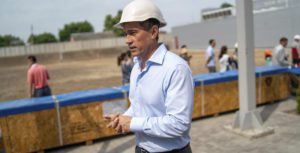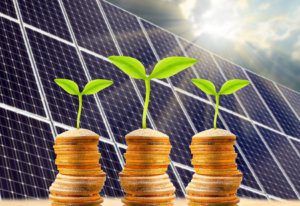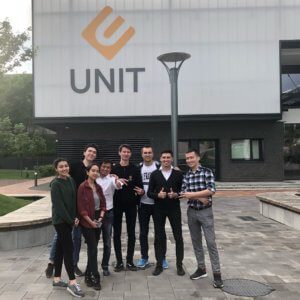
The UFuture investment group of Ukrainian businessman Vasyl Khmelnytsky plans to invest $2.5 million in construction of a composite plant in the Bila Tserkva industrial park within two years. “We together with Volodymyr Khmurych director of the Bila Tserkva industrial park laid the capsule of the new plant in the industrial park. Here in six months there will be a composite plant. In America, composite materials have already replaced metal by 15-17%,” Khmelnytsky wrote on his Facebook page.
According to him, the plant intends to create 100 jobs.
“Before starting the construction of a large plant, we leased a place in the workshop, bought one line of equipment, adjusted it and launched the first batch of the product. It cost only $85,000, we made sure that everything works, that the quality of the product is high, and decided to scale up production,” Khmelnytsky said.
He recalled that this will be the second plant in the Bila Tserkva industrial park, and by the end of the year it is planned to build three more.
As reported, the first plant in Bila Tserkva industrial park – Plank Electrotechnic, which will be the first in Ukraine to produce modern electrotechnic systems, was officially opened in April of this year. UFuture invested $ 2.8 million in its creation.
UFuture unites companies and social projects of Khmelnytsky. The group includes the Bila Tserkva industrial park, the UDP development company, the Sikorsky Kyiv International Airport, outdoor advertising operator RTM-Ukraine, as well as innovative businesses: UDP Renewables (creates and develops photovoltaic power plants under its control), the pharmaceutical company Biopharma, innovative parks UNIT.City and LvivTech.City.

UDP Renewables, part of UFuture Group of Vasyl Khmelnytsky, has built a solar power plant with an installed capacity of 18 MW in Kherson region, the businessman said on his Facebook page. “UDP Renewables has built an 18 MW solar plant in Rykove (Kherson region). Considering the fact that the Kherson sun is much more efficient than in Kyiv, we plan to fully pay back the investment ($18 million) in five or six years. The station will be connected in a few months,” he wrote. Khmelnytsky added that during the construction of the solar plant, racks, cables and inverters of Ukrainian origin were used, while solar panels were imported from China. To build the station, according to the businessman, the territory of the former industrial zone, unusable for agriculture, was used.
As reported, earlier the group of Khmelnytsky built the first stage of a solar plant with a capacity of 6 MW in the village of Velyka Dymerka of Kyiv region. After the construction of the first stage, the group attracted Spanish-based Acciona Energia Global as a partner for the expansion of the project.
UFuture Investment Group, headquartered in Brussels, was established in autumn 2017 and united the business projects of Vasyl Khmelnytsky. The group includes the Ukrainian development company UDP, whose specialization is the implementation of large infrastructure projects. In addition, the conglomerate united businesses in such areas as UDP Renewables, the Bila Tserkva industrial park, the innovative parks UNIT.City, and LvivTech.City.

Businessman Vasyl Khmelnytsky’s UFuture investment group will participate in the development of a project to create in Astana (Kazakhstan) a copy of the innovation park UNIT.City, which UFuture has been developing for several years in Kyiv. “I’ve just returned from Kazakhstan, where I was at the invitation of Prime Minister Bakhytzhan Sagintayev. We’ve agreed we will help create an analogue of UNIT.City in the center of Astana,” Khmelnytsky wrote on his Facebook page.
He said starting this autumn UFuture would launch a project to create an eco-system and a university in Astana, following the example of UNIT.City. He added that this project is already known in Kazakhstan, as Kazakh students study at Kyiv’s UNIT Factory.
Khmelnytsky positively assessed the experience of creating an international technopark for IT start-ups at the Astana Hub and the Astana International Financial Center, where residents enjoy a preferential tax regime, British law and an independent court of British judges. UFuture’s press service told the Kyiv-based Interfax-Ukraine news agency that it would be possible to speak about details of the possible participation of the investment group in the Kazakhstan project after the project was prepared.
As earlier reported, UFuture is situated on 25 hectares of land at Kyiv’s motorcycle plant where it is developing the UNIT.City innovation park. The “anchors” of the project are programming factory UNIT Factor created in spring 2016 under partnership with French School 42, and the Technology Companies’ Development Center (TCDC). Khmelnytsky has already announced plans to create similar projects in Lviv and Kharkiv.
UFuture Investment Group, headquartered in Brussels, was established in the autumn of 2017 and unites Khmelnytsky’s business projects. The group includes UDP Renewables, the Bila Tserkva Industrial Park, the innovation parks UNIT.City and LvivTech.City.

Only innovative entrepreneurs can buy apartments in UNIT.City Innovation Park. Vasyl Khmelnytsky, an entrepreneur and founder of UNIT.City, made this statement in an interview for AIN. “We have already built and sold about three million square meters and know this market well. We want to turn the idea into reality: to sell apartments only to people who promote innovations. When they go out for a walk here in the evening, they will start discussing something and can come up with a brilliant idea together. We see a blue ocean in it: we create the enabling environment where a success case can meet another success case, resulting in something greater. This is an experiment,” the businessman underlined.
He said he realized that such approach would put some restrictions on the company and narrow down a range of potential buyers. However, it is essential for him to make UNIT.City a home for visionaries, not for officials or people who deal with trade or cash-out transactions.
Vasyl Khmelnytsky placed emphasis that UNIT.City meant not simply buildings, but a big infrastructure facility focused on innovations and education.
When asked if people who deal with IT innovations and earn €20,000-40,000 a year can afford housing in UNIT.City, Mr Khmelnytsky said that it would be quite possible. With $1,500 per square meter, a 50 sq m apartment would cost $75,000. With a four-year installment plan offered by the businessman, it would cost about $20,000 a year.
According to Vasyl Khmelnytsky, UNIT.City is a long-term project where one can expect return on investment in several years only. Therefore, it is hard to go without international partners. To this end, the company has initially focused on global standards in construction technologies and transparency in financing.
The businessman pointed out that he planned to extend these practices to other regions of Ukraine. The company has already started building UNIT.City in Lviv and plans to do so in Kharkiv. Vasyl Khmelnytsky said $50 million has been invested in the project up to date. According to his estimates, total investment will amount to $700-800 million to be partly financed with office rental income and sales of apartments.
Vasyl Khmelnytsky said he had a strategy to develop UNIT.City. The park is expected to be completed in 2025. However, much depends on the demand for buildings and on the political environment, he said.
“UNIT.City is now completing two buildings, with 75% of each being already commissioned. This is an excellent performance for the local market, as it is typical for Ukraine to commission buildings for two years. Now we have a request for several new buildings at once, so a couple of construction projects are underway simultaneously. However, tomorrow something can happen, for example, the political situation will change in the country, bringing our entire strategy down. Our further actions may change. Therefore, I do not make any fixed plans. The company has the opportunity to build residential facilities here for two years or for five years — everything will depend on the demand,” Mr Khmelnytsky said, describing the project in a nutshell.